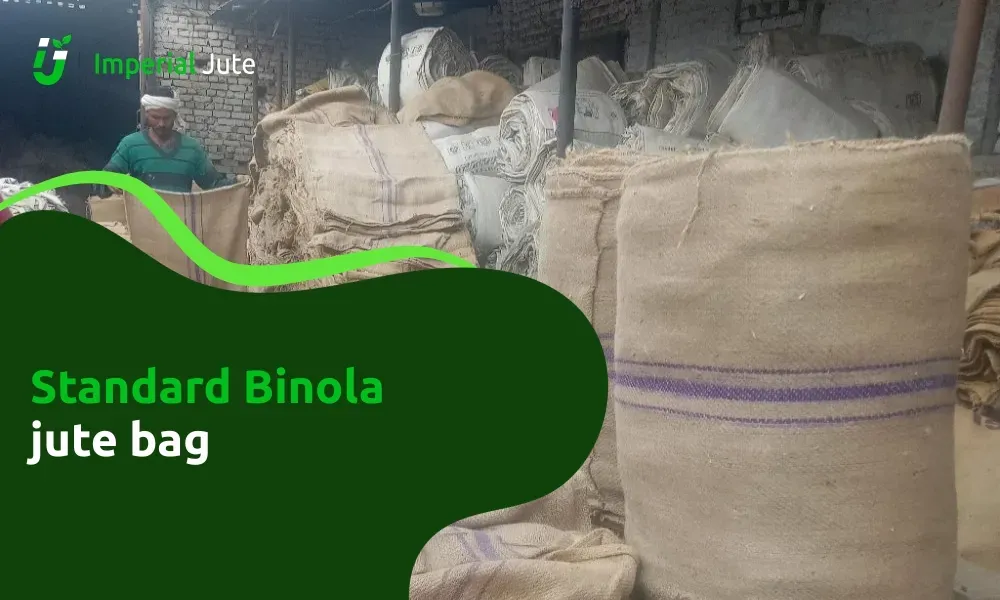Malaysia’s jute sacking bag exports have seen a remarkable rise in recent years, driven by eco-conscious businesses. But have you ever wondered how a traditional, biodegradable material became a modern trading sensation? This sustainable trend showcases Malaysia’s commitment to both environmental responsibility and economic growth.
Historically rooted in the Southeast Asian region, Malaysia’s jute industry has leveraged its strategic location for extensive trade. Exporters here cater to markets across Europe and North America, supported by an agglomeration of skilled craftsmanship and advanced logistics. In 2022 alone, the export value surged by 30%, reflecting not just the global demand but also Malaysia’s prowess in sustainable packaging solutions.
Malaysia’s jute sacking bag exporters are pivotal in the global market, meeting high demand for sustainable packaging solutions. They adhere to international quality standards, ensuring durable and eco-friendly products. Exporters leverage Malaysia’s strategic location and robust logistics, making timely deliveries to various industries worldwide.
Rising Demand in Malaysia’s Jute Bags Market
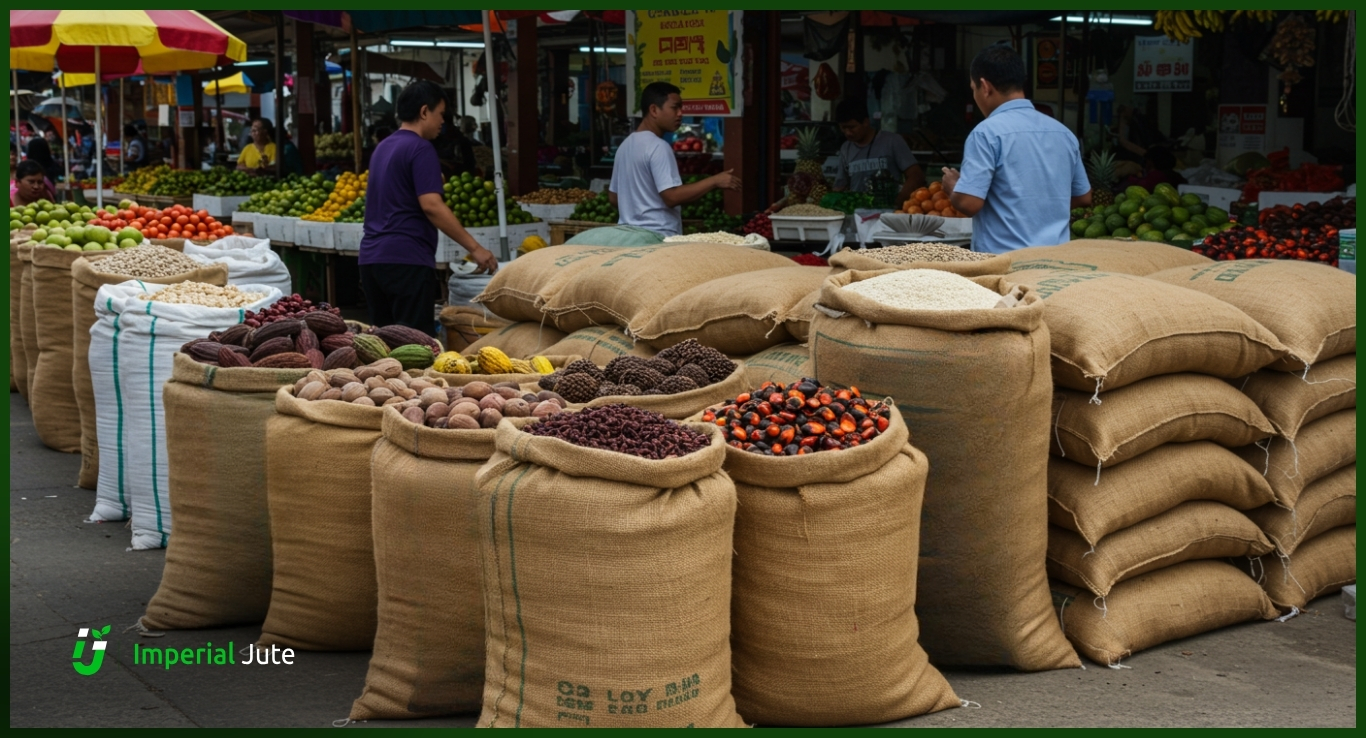
Malaysia’s jute bag market is experiencing significant growth, driven by a global push for sustainable packaging and increasing domestic awareness of environmental impact. As businesses and consumers move away from plastic, jute sacking bags have become the preferred alternative across multiple industries.
One of the biggest demand drivers is the agricultural sector, where jute bags are widely used to store and transport crops like rice, cocoa, coffee, and palm kernel. These bags offer breathability, strength, and biodegradability—features ideal for perishable goods.
The retail and wholesale sectors are also shifting toward eco-friendly packaging. Many brands now adopt jute bags not just for functionality but also to align with sustainability values. Supermarkets, fashion retailers, and exporters are integrating jute-based options into their supply chains to meet customer expectations and ESG goals.
In parallel, government policies and green procurement initiatives are accelerating this shift. Malaysia’s support for plastic reduction, alongside incentives for eco-conscious packaging, has created favorable conditions for jute-based solutions to thrive.
The result is a strong and rising market demand, with Malaysian exporters ramping up production and exploring new trade routes across ASEAN, the Middle East, and Europe. As jute bags continue gaining traction as a cost-effective and ethical packaging solution, Malaysia is positioning itself as a key player in the global sustainable packaging industry.
Jute Sacking Bag Types and Specifications for Export
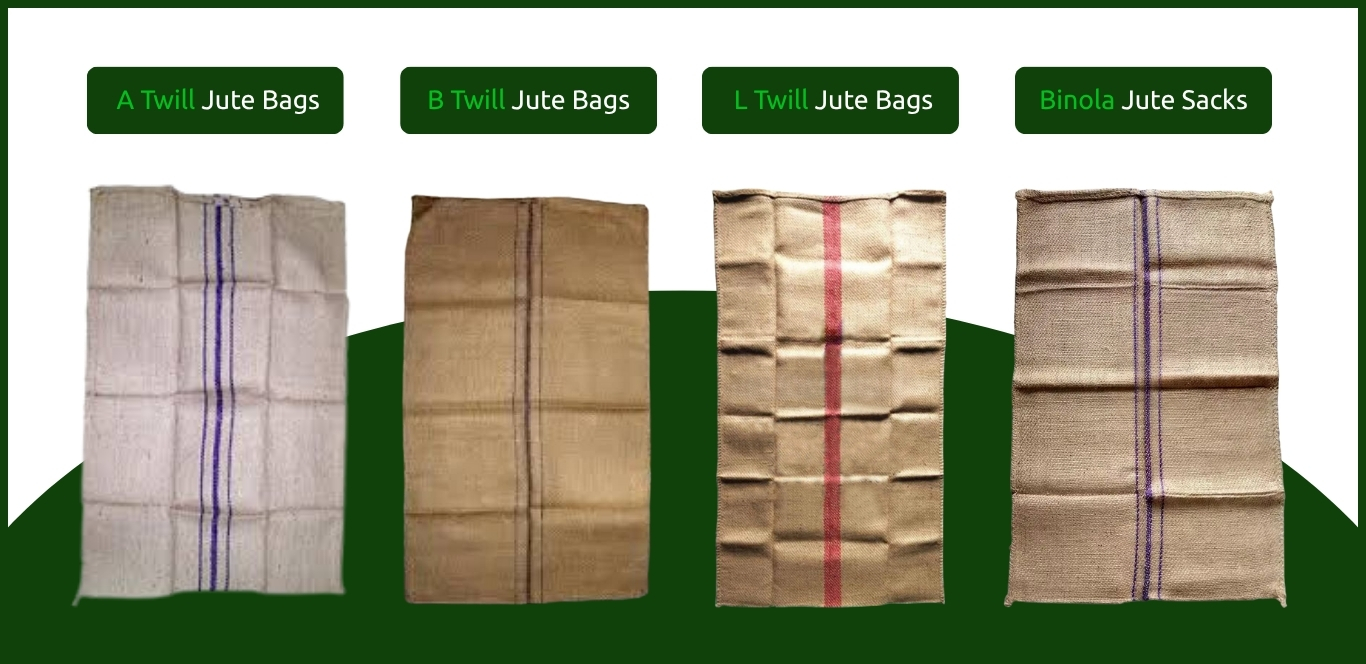
Jute sacking bags are primarily used in agriculture, food packaging, and bulk commodity storage. For buyers seeking durable, breathable, and biodegradable solutions, understanding the available types and specifications is essential for selecting the right product.
1. A Twill Jute Bag
These are heavy-duty bags commonly used for packing rice, wheat, and other grains. A Twill sacks typically weigh around 2.25 lbs and can hold up to 100 kg of content. They are suitable for export markets demanding high tensile strength and moisture control.
2. B Twill Jute Bags
B Twill is slightly lighter than A Twill, widely used for sugar, coffee, or flour exports. Standard capacity is 90–100 kg with a fabric weight of 1.8–2.0 lbs. Their breathability makes them ideal for perishable agricultural goods.
3. L Twill and D.W. Bags
These are lighter jute sacks used for packing fertilizers, charcoal, and industrial raw materials. They offer good load capacity at reduced cost and weight.
4. Binola Jute Sacks
Designed explicitly for cottonseed (binola) and oilseed industries, these sacks have coarser weaving and extra durability to handle rougher commodities.
Common Specifications
| Parameter | Specification Range |
| Material | 100% natural jute fiber |
| Weight (GSM) | 210–320 GSM |
| Capacity | 50–100 kg |
| Bag Size | 44″x26″, 43″x29″, 40″x26″ (customizable) |
| Stitching | Hemmed mouth & herakle stitching |
| Lamination | Optional LDPE or BOPP lamination |
| Printing | Custom branding available (1–3 color) |
| Finish | Hydrocarbon-free and food-grade options |
Malaysian exporters offer customization based on destination country, product type, and moisture level. All sacks can be pre-treated with vegetable oil batching for food-safe use or with water-repellent coatings for industrial packaging.
Whether you are sourcing sacks for bulk grains, industrial inputs, or retail packaging, Malaysian jute sacking bag exporters ensure consistent quality, compliance, and competitive lead times for international orders.
Buy Jute Sacking Bags from Trusted Bangladeshi Exporters
Bangladesh is the world’s leading source of high-quality jute sacking bags, supplying over 90% of global demand. With a long-standing heritage in jute cultivation and processing, Bangladeshi exporters offer unmatched expertise, volume capacity, and competitive pricing for bulk buyers across agriculture, retail, and industrial sectors.
When you buy jute sacking bags from Bangladesh, you gain access to:
- Diverse bag types: A Twill, B Twill, L Twill, Binola, and custom sizes
- Bulk availability: Monthly export capacity exceeding 1 million units
- International standards: ISO-certified, food-grade, and eco-compliant
- Custom branding: Print-ready bags with your logo and specifications
- Flexible shipping terms: FOB, CIF, and port-to-door delivery options
Bangladeshi exporters also offer value-added services such as lamination, batching oil treatment, and moisture-resistant coatings, tailored to the destination country and end-use industry.
Whether you’re a grain distributor, retailer, or importer seeking sustainable packaging, sourcing directly from Bangladesh ensures consistent quality, reliable lead times, and strong after-sales support. Major markets include the Middle East, Southeast Asia, Africa, Europe, and North America.
Working with a trusted Bangladeshi jute bag exporter means partnering with a supplier who understands your industry needs, offers competitive rates, and delivers eco-friendly products without compromising on durability or compliance.
Global Trends Influencing the Demand
Worldwide, the shift towards sustainability is a driving force behind the demand for jute sacking bags. Governments and organizations are banning single-use plastics, prompting the need for eco-friendly alternatives. As awareness grows, consumers are increasingly choosing products with less environmental impact. This global trend places jute bags in a favorable position. Their biodegradable nature resonates with the ongoing green movement.
An additional factor is the rise of green certifications and eco-labels. Both businesses and consumers prefer products like jute bags that meet these standards. This ensures that the sourcing and production processes are environmentally responsible. For instance, many companies now include jute bags in their supply chains to adhere to these certifications. This trend helps enhance the credibility of jute products.
The fashion industry also plays a significant role. Designers and brands are incorporating jute into their collections, creating a new appeal for this natural material. From stylish tote bags to trendy accessories, jute’s versatility is being explored. This Innovation not only boosts demand but also introduces jute to a broader audience. As a result, jute sacking bags have become more mainstream and trendy.
Additionally, the push for corporate social responsibility (CSR) has impacted the demand for jute bags. Companies are expected to adopt sustainable practices, and using jute products is one way to meet these expectations. Lists of eco-friendly companies often highlight those that utilize jute bags. This increases the visibility and acceptance of jute products globally. Therefore, CSR initiatives significantly influence the market demand for jute.
Roles of Jute Sacking Bags Exporters in Malaysia
Jute sacking bag exporters in Malaysia play a crucial role in meeting global demand. They act as the bridge between local producers and international buyers. By maintaining strict quality controls, these exporters ensure that the jute bags meet international standards. In addition, they oversee logistics to guarantee timely deliveries. This reliability helps build long-term partnerships with buyers.
Another key role involves promoting sustainable practices. Exporters encourage the use of eco-friendly materials, aligning with global environmental goals. They work closely with farmers and manufacturers to source jute that is grown and processed responsibly. Their environmental certifications often highlight their commitment to sustainability, which is reflected in the lists they provide. This transparency enhances their credibility in the global market.
Exporters also focus on Innovation. They continually seek ways to improve the design and functionality of jute sacking bags. It’s not just about producing any bag but creating ones that offer added value to customers. This may include enhanced durability or custom branding options. Such improvements make jute bags more attractive to various industries.
Marketing and market expansion are other significant roles. Exporters utilize various channels to reach new markets and increase brand visibility. They participate in international trade shows and exhibitions to showcase their products. Networking at these events opens doors to new business opportunities. As a result, Malaysian jute bags gain a foothold in markets worldwide.
Environmental Impact and Sustainability of Jute Sacking Bags
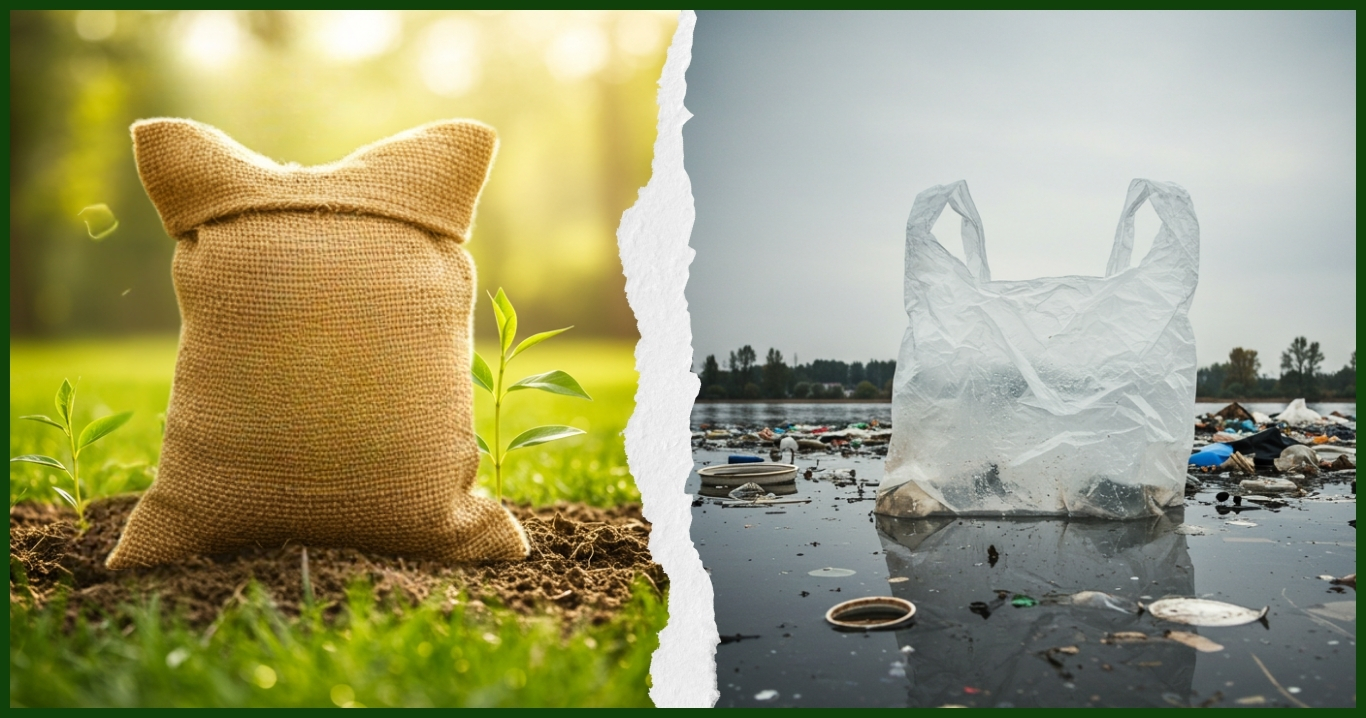
Jute sacking bags have a minimal environmental impact compared to plastic alternatives. Jute is a natural fiber, completely biodegradable and compostable. This means it returns to the earth without causing pollution. Additionally, jute plants require little water and few chemical fertilizers. These characteristics make jute an environmentally sustainable choice for packaging.
The sustainability of jute extends beyond its biodegradability. Growing jute also helps improve soil quality. The deep root system of jute plants prevents soil erosion and increases soil fertility. This makes jute cultivation beneficial for agricultural sustainability. It’s a win-win for both farmers and the environment.
Jute sacking bags contribute to reducing carbon footprints. The production process for jute bags generates significantly lower greenhouse gas emissions than plastic bag production. This helps in battling climate change. By choosing jute bags, businesses can send a positive message about their commitment to the environment. This also resonates well with eco-conscious consumers.
Transitioning to jute bags can also support local economies. Most jute is grown in developing countries, providing jobs and income to rural communities. The cultivation and processing of jute create employment opportunities. This helps in improving the quality of life for many families. Thus, the benefits of jute bags are both environmental and socio-economic.
Moreover, jute sacking bags are reusable and durable. Unlike single-use plastic bags, jute bags can be used multiple times. This reduces the need for frequent replacements and further cuts down on waste. Lists of households opting for jute bags instead of plastic ones show significant waste reduction. These small changes can lead to a substantial positive impact on our planet.
Economic Contribution of the Jute Sacking Bags Industry in Malaysia
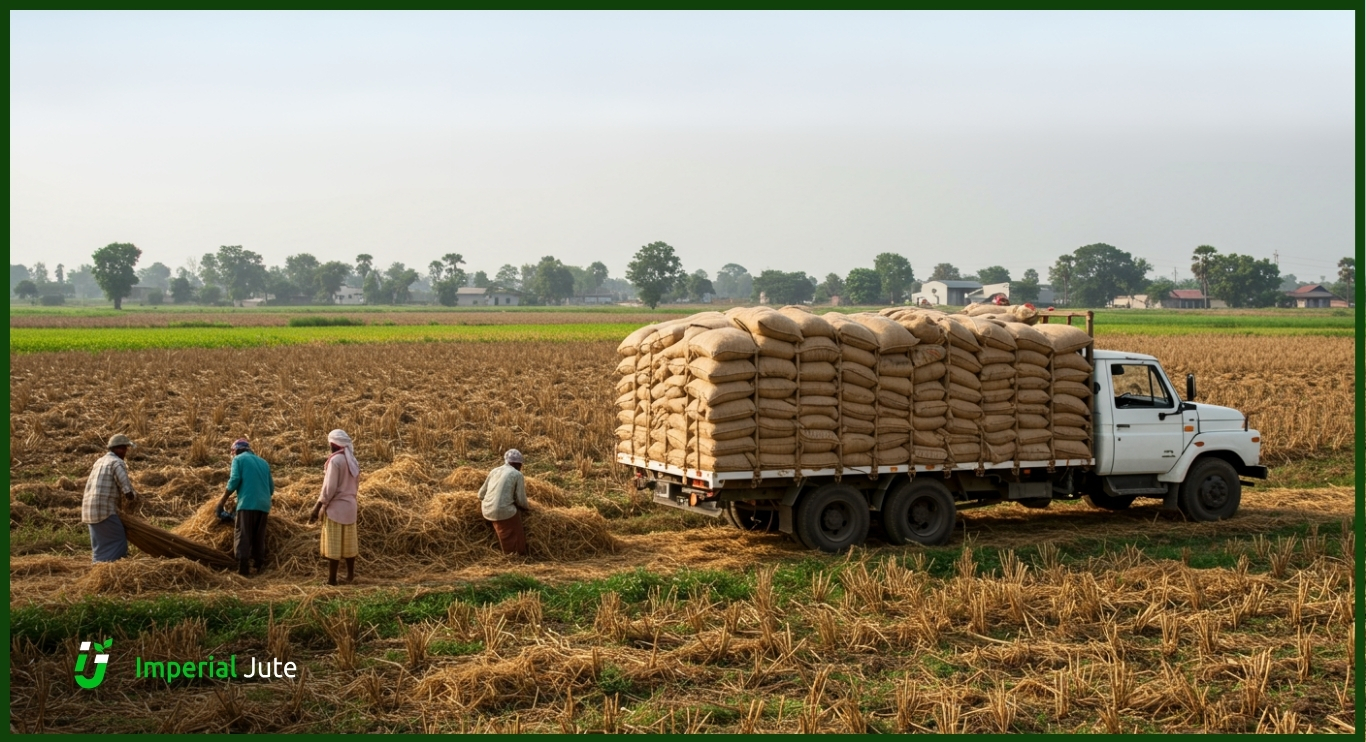
The jute sacking bags industry plays a vital role in Malaysia’s economy. It generates significant revenue through exports. These bags are in high demand in international markets, especially in the agriculture and retail sectors. As a result, the jute industry boosts Malaysia’s trade balance. This brings in foreign exchange and strengthens the nation’s economy.
Jute bag production creates numerous jobs. From farming to manufacturing and exporting, the supply chain is extensive. This provides employment opportunities for many Malaysians. Lists of job categories in the jute industry include roles such as farmers, factory workers, and logistics experts. This job creation helps lift communities out of poverty.
Small and medium-sized enterprises (SMEs) benefit greatly from the jute industry. Many SMEs are involved in the cultivation and processing of jute. They contribute to local economies by providing jobs and supporting related industries. These small businesses often collaborate with larger companies for export, expanding their market reach. This symbiotic relationship aids economic growth.
The jute industry also spurs investment in infrastructure. To meet global demand, there is a need for improved manufacturing facilities and better transportation networks. These investments lead to the development of rural and urban areas alike. Improved infrastructure benefits not just the jute industry, but other sectors as well. This can have a lasting impact on overall economic development.
Government initiatives and support have further bolstered the industry’s economic contributions. Subsidies for jute farmers and manufacturers encourage continued growth. Policies promoting sustainable practices attract international buyers looking for eco-friendly options. By incentivizing the jute industry, the government helps ensure its long-term viability. This support strengthens Malaysia’s position in the global market.
Challenges Faced by Jute Sacking Bags Exporters in Malaysia
Exporters of jute sacking bags in Malaysia face a variety of challenges. One primary issue is fluctuating raw material prices. Jute prices can be unpredictable, impacting the cost of production. This fluctuation makes it difficult to maintain consistent pricing for international buyers. The volatility can hinder long-term contracts and stability.
Another significant challenge is competition from synthetic alternatives. Despite the environmental benefits of jute, cheaper plastic alternatives remain popular. Competing with these plastic products on price is tough for jute exporters. To tackle this, exporters need to emphasize the eco-friendly benefits of jute bags. However, convincing consumers to pay a premium can be challenging.
Supply chain disruptions also pose threats to jute exporters. Factors like weather conditions and transportation issues can delay shipments. These disruptions can result in missed deadlines and strained client relationships. Investing in more robust logistics solutions can mitigate some of these risks. Nonetheless, unforeseen disruptions remain a persistent concern.
International regulatory standards add another layer of complexity. Different countries have varying regulations regarding the import of jute products. Meeting these diverse standards requires constant monitoring and adjustments. Exporters must stay updated on the latest compliance requirements. This is an ongoing effort that demands resources and expertise.
Issues related to quality control further complicate the export process. Ensuring that the jute bags meet international quality standards is critical. Any lapse in quality can damage the exporter’s reputation. Routine checks and certifications are essential, but they add to operational costs. Maintaining high standards necessitates a well-trained workforce and rigorous practices.
The Future of Jute Sacking Bags Export Industry in Malaysia
The future of the jute sacking bags export industry in Malaysia looks promising. One major reason is the growing awareness and acceptance of sustainable practices. Companies and consumers worldwide are shifting toward eco-friendly alternatives. This shift provides a robust market for jute products. As sustainability becomes more mainstream, demand for jute bags is expected to rise.
Innovation will play a key role in the future development of this industry. By incorporating new technologies, exporters can enhance the quality and functionality of jute bags. For example, blending jute with other materials could produce stronger, more versatile bags. These improved products will cater to broader markets and diverse applications. Investment in research and development is thus crucial.
The digitalization of business operations also holds promise for Malaysian exporters. E-commerce platforms offer a global marketplace for jute sacking bags. Exporters leveraging these platforms can reach a broader audience easily. Enhanced online presence can lead to increased sales and brand recognition. Digital marketing strategies may include social media campaigns and search engine optimization.
Government support is another factor that bodes well for the industry’s future. Continued policies promoting sustainability could further boost the jute sector. Tax incentives and subsidies for eco-friendly businesses may encourage more players to enter the market. This creates a favorable environment for growth and innovation within the industry.
Strategic partnerships could further strengthen Malaysia’s position as a leading exporter of jute bags. Collaborations with international firms can provide access to advanced technologies and new markets. Such partnerships foster knowledge exchange that benefits all parties involved. Therefore, building strong alliances with global companies can offer promising opportunities.
Frequently Asked Questions
Here are some common questions and answers about the jute sacking bags export industry in Malaysia. These will help you understand more about the topic.
1. Why is there a growing demand for jute sacking bags?
The demand for jute sacking bags is increasing due to their eco-friendly properties. People are becoming more aware of environmental issues and prefer biodegradable options like jute over plastic.
Additionally, jute bags are durable and cost-effective, making them an attractive choice for packaging. Many industries, such as agriculture and retail, find them beneficial for storing and transporting goods.
2. How do Malaysian exporters ensure the quality of jute sacking bags?
Malaysian exporters maintain quality by adhering to international standards. They implement strict quality control measures at every stage of production.
This includes regular inspections and testing to ensure durability and strength. These practices help build trust with global buyers who expect high-quality products.
3. What challenges do jute sacking bag exporters face?
One major challenge is the fluctuating prices of raw materials. This makes it hard to keep consistent pricing for buyers.
Another issue is competition from cheaper plastic alternatives. Despite being eco-friendly, convincing customers to pay more for jute can be challenging.
4. What role does technology play in the jute bag industry?
Technology helps improve both production efficiency and product quality in the jute bag industry. Innovations include advanced weaving techniques and better logistics management systems.
These advancements allow exporters to produce stronger, more versatile bags while also ensuring timely delivery to international markets.
5. How does government policy impact the jute sacking bag industry?
The Malaysian government offers various subsidies and incentives to promote sustainable practices in the jute industry. Policies favoring eco-friendly products help increase demand for jute bags both locally and internationally.
This support not only benefits exporters but also encourages farmers to cultivate more jute, leading to expanded production capabilities.
Conclusion
The jute sacking bags industry in Malaysia stands at the crossroads of sustainability and economic growth. With rising global demand, there is immense potential for expanding exports. However, overcoming challenges like fluctuating raw material prices and competition from synthetic alternatives remains crucial.
Continued government support and innovations will be vital to future success. As more industries and consumers embrace eco-friendly practices, the role of jute sacking bags exporters will grow even more significant. The road ahead is promising, filled with opportunities to make a lasting impact.
